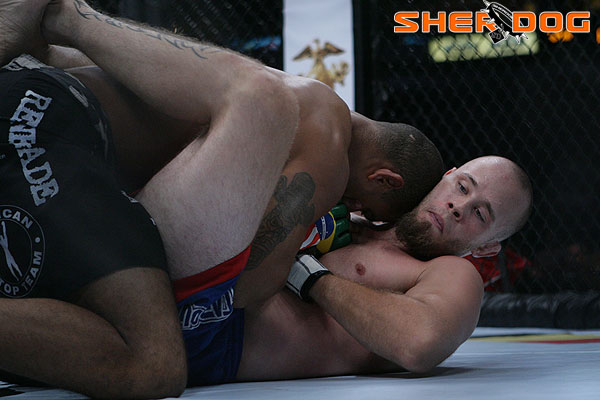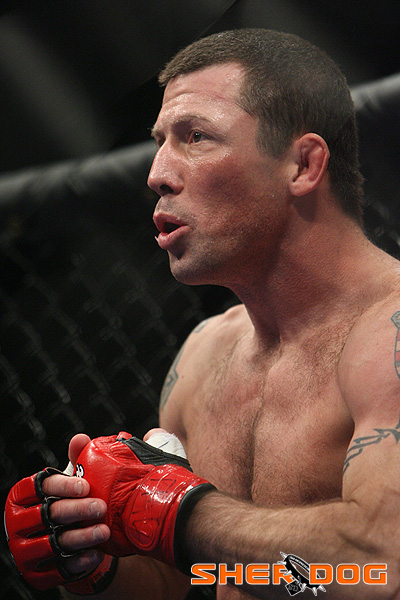Stories from the Road: Jeremy Horn
Flying Mouthpieces

Jeremy Horn has recorded 91 victories, 63 of them by submission.
| Photo: Dave Mandel/Sherdog.com
Jeremy Horn is a gritty guy who remembers the craziness, the nascent MMA times when the so-called bad asses, with their piercings and tats, would eye up the skinny, pale kid in the weigh-in lines and hope to get a crack at him. It usually spelled disaster for anyone that underestimated the bony “Gumby,” from a barroom bully to a loud-mouthed cage wannabe.
Horn is a legend that has been in with the legends, having faced a monster’s pantheon of Anderson Silva, Chael Sonnen, Chuck Liddell, Forrest Griffin, Randy Couture, Dan Severn and Frank Shamrock.
Advertisement
“I wouldn’t change a thing, and it’s kind of hard to say because of all the people that came up then, it’s what shaped everybody into who they are today,” said Horn, who still competes at the age of 40. “You see a big difference in the fighters of today, and obviously it’s kind of upsetting and irritating to me to see a lot of today’s fighters doing and saying the things knowing how we grew up as a sport back then. When we were fighting, everything was so raw, so new, that you went into the ring assuming pretty much that you were going to die. This was a life-and-death fight. It goes through your head: ‘I can die here.’ There wasn’t a whole lot of playfulness in the ring. We were all pretty serious.
“These guys are softer today because they have it easier than my
generation coming up,” he added. “Well, I don’t know if it’s so
much about being softer, I guess, but for example, when I first
started fighting, if you made $50 or $100 a fight, you were lucky.
Now, I have guys calling me from across the country if I’m
promoting a fight, and their record is 3-12. They want $1,000
and they want me to fly them out. I’d like to yell at them,
‘What the hell are you thinking, dude?’ Who in their right mind is
going to fly someone across the country who no one ever heard of
with a horrible record?”
Then Horn relayed a story of the newbies that show up at his gym. They want to learn at the feet of the legend. They tell Horn that they quit their day job and that they are going to commit their life to fighting. First, they have to drop the cigarette from the corner of their mouth. Then, they have to drop about 25 pounds to get even close to some semblance of fighting shape. Horn will shake his head, roll his eyes and preach a harsh reality. He will tell them he came from a time when he fought every weekend, for sometimes $200 or $300, always for the love of fighting and not the dollars at the end. If the money comes, it comes with success. It comes from the furnace of hard work and a commitment to learn.
“I tell them to go get a job, start training and then come back and let’s see where it goes,” Horn said. “These guys today want to make a quick buck and do it for money, not for the love of the sport. That’s the problem. They have a hard time getting motivated to train. They tell me to find them a fight and then they’ll start getting motivated to train. The only reason they’ll come back to the gym is because they have to get ready for a fight. Otherwise, they don’t actually like training. They begrudgingly train because they have a fight. I look at them and say, ‘Really?’ I fight because I love it.”
Horn has tons of stories from the early days, stories to which today’s fighters may not relate but should hear, since it was fighters like Horn that increased the paydays and credibility of MMA in the eyes of the American sports consumer. People today know Ronda Rousey, Jon Jones and Conor McGregor. They know because of the pioneers.
“I have mixed feelings about the growth of the sport,” Horn said. “I’m certainly glad that the sport is growing. Obviously, though, with growth comes money and with money comes corruption. More people are getting access to MMA, and it’s changing their lives. They’re getting fights. That’s good. At the same time, I don’t like to see it grow, because along with that comes all the douchebags that want to bleed money out of the sport -- and not because they love it. Either you love martial arts and want to make a change in your life, and if that’s not why you’re here, then move on.”
‘TALLADEGA NIGHTS’ SNOWPLOW
Monte Cox and his troupe of fighters -- Horn, Jens Pulver, Matt Hughes and a few others -- crammed into a car coming home from one of Cox’s shows down South. They slammed right into a blinding snowstorm on a north-bound highway through Illinois, I-15 Horn believes. Cox was driving behind a semi and tried passing it in the left-hand lane. Chaos ensued.
“It was terrible weather. In the middle of the night, we come around a semi and the car was hit with a gust of wind and Monte lost control of the car,” Horn said, looking back with a laugh. “He was trying to get back into the lane and had no control of the car, as we’re sliding on the ice. Monte finally gave up. He takes his hands off the steering wheel, literally throws his hands up in the air and says ‘[Expletive] it. That’s it. We’re done!’ I can laugh now, because it reminds me of one of the crash scenes in the movie ‘Talladega Nights’ where Will Ferrell is spinning through the air and says, ‘Yep, I’m flying through the air and this is not good.’
“With us, all hell was breaking loose,” he added. “We’re yelling at Monte and everyone is going crazy. The ‘Talladega Nights’ scene is Monte. We’re flying down this eight-foot embankment on the side of the road, and Monte was so calm: ‘We’re done.’ That’s Monte’s demeanor. We’re spinning circles in a raging snowstorm on the freeway, and he goes, ‘I’m done,’ totally calm, like we don’t have any more [options].”
Luckily, the car was pointed in the right direction when it landed in the embankment. Horn and the guys got out of the vehicle and pushed it, so Cox could build enough speed and the car swerved back up on the road.
“We were lucky, because the way highways are shaped, every few miles there is a cement cutout so emergency vehicles can drive between the highways,” Horn said. “There is a big valley between the freeways, except where that concrete cutout is. It’s like a dead end basically. We got back up on the freeway, and we were about 10 feet from the dead end concrete cutout. If he would have driven straight 10 more feet, Monte would have totaled his car, but we all got back into the car and drove home laughing about it. We always bring it up to Monte and still laugh about it today.”
BEWARE OF FLYING MOUTHPIECES
In the late 1990s, “Gumby” would compete in something called the Submission Fighting Championships, which was promoted by the late Brian Madden, who, according to Horn, put on very good shows and treated fighters fairly. Horn was slated to fight Derrick Ruffin in Carbondale, Ill., on Nov. 6, 1998.
“Brian was a really, really good guy who paid well, $800-$1,000, which was good money back then,” Horn said. “I got invited to this submission show, and it was held outside at this fairground. We’re in the first round and I’m on Ruffin’s back and I’m choking him. He gets up on all fours and crawls out of the ring. I had the choke locked in and I’m pissed, because I hold on for one more second and he would have tapped. Both of our upper bodies are hanging out of the ring when the ref decides to stop it. I get up and I’m pissed, so I chucked my mouthpiece out into the crowd.
“The referee then tells me it’s not over,” he continued. “He’s going to restart the fight, because we were outside the ring. I had to catch the attention of some kid running around and have him go find my mouthpiece, now 10 rows deep in the dirt, and have him bring it back to me so I can use it again to finish the fight. The ref restarts us just the way we left it, with both of my hooks in and one arm all the way under Ruffin’s chin in the middle of the ring. The restart was literally two seconds. The ref says ‘Go.’ I squeezed and got a tap. The restart was absolutely worthless.
“I actually bumped into Derrick a few times since then, and he’s a good guy,” Horn added. “We’re talking about 1998 here, and MMA was still sort of the wild, wild west in a lot of areas. Most people didn’t know what they were doing back then, myself included. I kind of had an idea how to fight, but mostly, I rolled with the punches. Nobody really knew what was going on. MMA was a brand new sport that everyone was becoming a fan of. We jumped in to see what we could make of it.”
NO WARM-UP NECESSARY
At another HOOKnSHOOT event, Horn distinctly remembers running into John Renken. He was a gritty guy like Horn, an old-school hard ass who loved every chance he got to fight. He fought in several weight classes. He did not care who or where he fought. Apparently, he did not care about something else, either.
“
was so raw, so new, that you went
into the ring assuming pretty much
that you were going to die. This was a
life-and-death fight. It goes through your
head: ‘I can die here.’ There wasn’t a
whole lot of playfulness in the ring.
”
Horn started to laugh, because he went over to Renken, just trying to be a good guy and give a fellow fighter a nudge.
“‘Hey man,’ I told him, ‘Your fight is coming up. Aren’t you going to warm up?’ He looked me dead in the eye and says, ‘That’s what the first round is for,’” Horn said. “No expression on his face. He fully intended to go out there 100-percent cold, no warm-up or anything, and use the first round as his warm-up. Never saw anything like it. He won his fight, too. Renken was another one, because he knew what he was doing. He had a kickboxing background and had a fair amount of grappling experience. Renken was well ahead of the times back then.”
Finish Reading » “We had what was like a paintball game in the middle of Tokyo. We would have never gotten away with that in the United States, especially with the climate today -- a bunch of kooks shooting each other with BB guns. Three guys running around waving guns at each other, which would never happen today without someone thinking it was serious. It was a lot of fun back then.”
Related Articles








